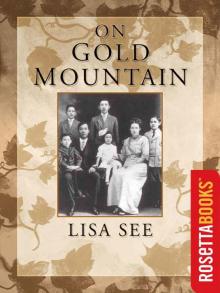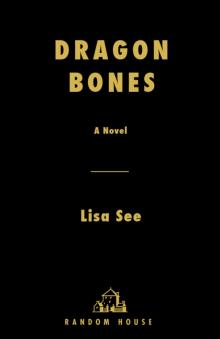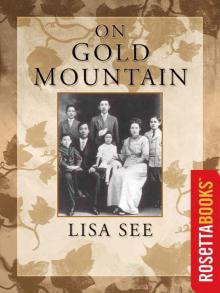The Interior Read online
Page 4
Ridiculous Chinese laws might be acceptable to couples like Chai Hong and Mu Hua. In fact, they might even work. David knew of many couples even in the U.S. who kept bicoastal relationships romantic and alive. But ten thousand miles was too great a distance with a woman like Hulan. He needed to see her eyes when she told him she was pregnant. He needed to be face to face with her to ask why she’d waited so long to tell him. Today he’d needed to see her eyes when she said the word friend.
David arrived at the U.S. Attorney’s Office at nine. He was dressed in corduroys and a Polo shirt instead of his usual suit and tie. He grabbed a cup of coffee and headed down the hall to his office. Today he had no appointments or court appearances. In fact, for the first time in years he had nothing on his calendar. No cases on the docket. No depositions to set up. No special assignments. All he planned to do today was clean up his office after months of trial work. Later, workmen would come by with dollies to take away all the boxes and put them in the file room for temporary residence before moving them to a big government warehouse.
David sat for a few moments behind his desk, where files and correspondence were piled together haphazardly. Along the walls were stacked dozens of boxes already filled with trial transcripts, interviews with witnesses, and photocopies of evidence from the Rising Phoenix cases. Against many of the boxes were propped large poster boards. Some charted evidence, some served as time lines, others showed diagrams of crime scenes. Facedown on a set of boxes near David’s desk were post-mortem photographs, which graphically showed the handiwork of the Rising Phoenix. The triad had once been the most powerful Asian organized-crime syndicate in the city. Now, after a series of trials that David had headed—at one point he’d supervised four cases involving other gang members in addition to his own trials involving the triad leader and his lieutenants—the Rising Phoenix’s members were either dead, behind bars, or had been absorbed by other gangs.
During the trials David had received several death threats. He hadn’t taken them seriously, but the FBI had. They put a trace on his phone and arranged for round-the-clock surveillance. The routine was claustrophobic and enervating, but—as the agents had reminded him on their last night of duty after the trial was over—he was still alive. Better to be safe than sorry, they said.
David took a sip of coffee, grabbed a box, then began sifting through the papers on his desk. There was a time when he would have kept the congratulatory letters, but now he tossed them, even the one from his ex-wife, in the trash. His secretary had grouped about a dozen invitations together with a rubber band. Without opening them, David dumped these as well. Why should he look at them? He knew what they were. Ever since the O.J. case, lawyers had become pseudo celebrities. Hostesses and fund-raising groups liked to invite lawyers who’d been on the news every night to give their parties a buzz. Other invitations were issued by private law firms. With his rise in celebrity—and with every Rising Phoenix conviction—several headhunters had phoned to inquire if he wanted to go back into private practice. Old friends, who’d been ensconced in firms for years, had called out of the blue to ask if David would like to have lunch with the senior partners or stop by for drinks. David had said no. He understood that this chapter of his life was over, but not knowing what would happen with Hulan had put his career in limbo.
By eleven, David had gone through the easy piles. Now he moved on to the everyday materials that he’d needed during these last months of back-to-back trials. As he began looking at the folders—knowing that they held so many lives that had been lost or ruined—he couldn’t help but be aware of his own dejection.
Like most lawyers, David often experienced melancholy after the completion of a trial. But this time he was also hounded by a sense of futility. Sure, he’d been successful. The Rising Phoenix had been brought down, but as David had predicted, other triads had filled the vacuum. A couple of months ago, the Sun Yee On had become more active in Southern California. At that time David was deep into trial, so the case had been handled to someone else in this office. More recently the Wah Ching group had been caught with a shipment of heroin coming in from the Golden Triangle. That case had gone to the narcotics unit. The media loved a big drug case, and attention had finally shifted from David’s work. The baton, so to speak, had been passed.
After the favorable conclusion of a big case, an assistant U.S. attorney was expected to parlay that triumph into a lucrative job in the private sector. The calls from the headhunters only verified for David that it was time to move on and that there were opportunities out there. At the same time, his name was being bandied about for U.S. attorney. If he believed the newspapers, his appointment and confirmation were assured. The current U.S. attorney, Madeleine Prentice, was behind him too. She’d been encouraging him to throw his name into the hat ever since her nomination to the federal bench. Madeleine’s was a path that David had once aspired to, but he no longer desired it. True, he no longer trusted his own government, but it was more personal than that: he wanted to be with Hulan, to be with her when she gave birth to their child, to live together as a family.
So he had come back to thoughts of Hulan. Hours had passed since her call, and he was still worried about her. David hadn’t been completely forthright with Hulan this morning, and it bothered him now. He knew how he could get information about Knight International, but he hadn’t mentioned it. Recent press coverage had focused on speculation that the company was about to be bought by mega-toy company Tartan International. His old law firm, Phillips, MacKenzie & Stout, had long done Tartan’s legal work. Tartan, a major client, paid millions of dollars in legal fees each year. As name partner and firm rainmaker, it was expected that Miles Stout would keep a close guard on his best client, and he had. He had managed the acquisition of several smaller companies by the conglomerate and had served as Tartan’s spokesman for many years. Additionally, he represented Randall Craig, the chairman of Tartan. But when it came to the actual grunt work for the company—licensing deals, handling esoteric copyright-infringement violations, or performing due diligence during contract negotiations—Miles passed most of it on to junior partners and a flock of associates.
When David had been at the firm, he’d been friendly with Keith Baxter, one of the young attorneys who’d been corraled by Miles into the Tartan work. David reached for his Rolodex, found the number for Keith’s private line, and put through a call. After a couple of minutes, David and Keith had made arrangements to meet at the Water Grill on Grand Avenue for drinks and dinner. Keith was a good guy, pretty open. The next time Hulan called, David was sure he’d be ready with whatever information she might want on Knight.
At seven, the Water Grill was jammed with the pre-theater dinner crowd, as well as people who’d come down out of their office towers for business dinners or romantic evenings with their spouses. The Water Grill specialized in seafood, and here and there men and women wore big plastic bibs to protect their clothes from the splatter of bouillabaisse or flying pieces of cracked crab. At other tables customers attacked towering fruits de mer platters piled high with shrimp, oysters, mussels, and seaurchins.
David followed the hostess as she wended her way through the main room to one of the banquettes along the far wall. Keith was already seated and nursing a scotch on the rocks. A waitress came up and asked if David wanted a drink. “Shall we get a bottle of wine?” David asked Keith. When Keith nodded, David ordered a bottle of Chateau St. Jean. Moments later, wine had been poured for David, and Keith was working on another tumbler of brown liquor. During this time David sized up his old colleague.
Ten years ago, Keith had come to Phillips, MacKenzie fresh out of law school. He hadn’t known much about law except how to take a test and argue with a teacher. And, with the exception of moot court, he’d never tried a case in front of a jury. But at the law firm, as it was in private law firms across the country, he hadn’t been expected to try a case for many, many years. He’d been assigned to several of David’s matters, had written
briefs, done document reviews, and summarized witness testimony. When David left Phillips, MacKenzie, Keith was a senior associate. A couple of years ago he’d made partner and decided to focus more on mergers and acquisitions. But as a junior partner he was nothing more than a glorified associate—working hard but getting little of the credit or the fun.
Sitting across from Keith now, David saw that the past decade had been hard on the younger man. He’d once been a bit of an athlete, but he’d put on weight and begun to lose his hair. And the drinking? That was something David didn’t remember.
Over dinner—Hawaiian mahi mahi on nori rice with blackened sesame seeds for David, grouper with an ancho chili sauce for Keith—the conversation concerned mutual friends, legal committees they were involved with, and news from the headlines. They bantered about David’s captivity at the hands of the FBI security team—the fast-food meals, the lingo, the sense of importance the men and women agents brought to a job that David thought totally unnecessary. Once the dishes were cleared, Keith ordered brandy while David settled for coffee.
Finally David asked, “They still have you slaving away over there?”
“Yeah, you know how it is,” Keith said.
“Have you tried any cases yet?”
“Shit no. I’m corporate all the way now.”
“It’s not too late to go back to litigation. If you want experience, come to the U.S. Attorney’s Office. By the end of the first year, you’ll have been in court so many times—”
“But my bank account would be empty.”
David shrugged. “There are things other than money.”
“Really, what?” The bitterness in Keith’s tone made David look up.
“Doing right, working on the side of justice, putting away bad guys.” David said the words, but he didn’t know if he believed them anymore. So much had happened in his own life and to his sense of who he was and what he did.
As if reading these thoughts, Keith asked, “How can you still spout that stuff after all you’ve been through?” When David didn’t respond, Keith continued, “After everything that happened to you in China…”
No one was supposed to know exactly what had happened to David in China. Was Keith speculating or did he actually know something? David decided to dismiss the comment with a laugh.
“All I’m saying is that you might have more fun if you changed jobs,” David said. “It doesn’t have to be the government. There are other things you can do.”
“What about my clients?”
When David raised an eyebrow inquiringly, Keith continued: “Okay, so they aren’t my clients exactly, but I still feel responsible for them. I may not be the name partner, but I’m the one the clients talk to day to day.”
“Who are you working for?”
“In the firm? Miles, of course.”
“Some things never change.”
“Oh, they change, all right.” There again was that bitter tone.
“How do you mean?”
“David, you don’t want to know. I mean, you’d recognize the place. We’ve got the same carpet and draperies and oak desks and all that shit, but, man, we’re at the end of the millennium. Practicing isn’t the same.”
“We all get burnt out,” David offered, but Keith just shook his head and took another sip of brandy.
After a pause Keith said, “You didn’t ask me out to dinner to catch up. What’s up? You want to come back to the firm? You throwing a bone my way? If I get you to come back, I’d be guaranteed a bonus at the end of the year.”
The two men stared at each other for a moment, then both cracked up. David realized that it was the first time this evening he’d seen anything of Keith’s old sense of humor.
“It’s not that, but when the time comes, you’ll be the first to know.”
“I doubt it. The name partners talk about you all the time. I’m surprised you haven’t heard from them yet.”
David thought about the unopened invitations he’d thrown away, but before he could follow up, Keith’s smile faded and the moment passed.
“So what do you want?” Keith asked.
“It’s about Knight International. Since Tartan’s buying the company, I thought you could tell me about it.”
“Anything I could tell you would fall under the auspices of privileged information.”
David waited, hoping Keith would say more. Instead Keith took another swallow of brandy, then waved his empty glass in the air to signal the waitress he wanted another. As Keith brought his hand back down, David noticed it was shaking. Had he been nervous all night?
“Come on,” David said at last. “What’s Knight up to these days?”
“Why are you asking? Is this some Justice Department investigation? Because if it is, you’re way out of line.”
“That’s a leap! I ask a simple question and you give me that?”
Keith shrugged. “I told you. Things are different at the firm. We have to be careful of outsiders.”
“I’m not an outsider.”
“But you’re not bound by what I tell you either.”
“The way you’re talking makes me think you or the firm or Tartan has something to hide. Lighten up! I just wanted some background on Knight. I thought you’d be a knowledgeable source.”
“Do me a favor and read about Knight in the papers.”
The conversation had taken a bizarre turn. Sweat had formed on Keith’s forehead, and he wiped it with a napkin. His face was flushed—from drink, from anger, from the heat of the room, David couldn’t tell. But there was something more here. Since when wouldn’t an old friend answer a simple question? Did Keith think it was some kind of ethics test? And that nonsense about an investigation? All this was probably just the alcohol talking. David could wait to ask his questions until tomorrow, when Keith would probably call and say his head hurt like hell and he was sorry for acting like such an ass. Instead David decided to lay his cards on the table.
“My girlfriend…” It was strange to call Hulan his girlfriend, but what was the proper word? He cleared his throat and tried again. “My girlfriend lives in China.”
Keith grinned, his mood switching again. “Liu Hulan. I never met her, but I remember you talking about her. When we first met you were about as brokenhearted as they come. I heard you reconnected, shall we say?”
David ignored Keith’s kidding. “One of her friends had a daughter who worked at a Knight factory in China,” David continued. “I didn’t know they had factories over there.”
“They have one. Old man Knight thinks of himself as cutting-edge when it comes to manufacturing. What could be more cutting-edge than China?” When David didn’t respond, Keith went on, “I’ve been over there, you know, doing the due diligence work and working with Knight’s American accountants to get all the financials in order for review by the Securities and Exchange Commission. I’ve seen a lot of stuff.”
“Like?”
Keith considered, then said, “Nothing exciting. It’s a factory out in the boonies, and I can tell you that those accountants Knight flew in suffered from major culture shock from the food and the strangeness of the place. Those guys came and went as fast as they could.” Almost as an afterthought he added, “Although I don’t know why. Knight only employs women—some pretty ones too.” He wiped his forehead again.
David stared at Keith, trying to make sense of the strange fluctuations in the other man’s behavior. Finally David asked, “What’s going on?”
“What do you mean?” There again was that testy tone, a response that was far removed from what David expected from his friend and colleague of many years.
“You seem to be under a lot more pressure than I’ve ever seen you. What’s happening?”
Keith’s eyes seemed to get watery, but he covered this by lifting the snifter and taking another sip of brandy.
“I can’t help you if you don’t confide in me,” David persisted.
Keith put the snifter down. “I’m in a bind,�
�� he said, keeping his eyes focused on the inside lip of the glass. “I’m in trouble and I don’t know what to do.”
“What is it? Can I help?”
“It’s personal.”
“Keith, we’ve known each other a long time—”
“And it’s professional,” he said, raising his eyes to meet David’s.
For the second time this evening, the honorable, yet sometimes horrible, code of ethics to which honest lawyers adhered had come into the conversation. They could skirt around the code: David could ask general questions about a client (Tartan) or about what that client was involved in (the acquisition of Knight), and Keith might even answer them, although he certainly hadn’t tonight. But to exchange real information about a particular case, a particular client, a particular act involving jurisprudence? To actually divulge that a lawyer had been involved in something shady or sinister or straight-on illegal was another matter entirely. They both knew it was taboo.
David took a deep breath. “Is there something I can do?” He hesitated, then asked, “Do you need to talk to someone at the Justice Department or the FBI? You know I can arrange it.”
But Keith just shook his head. “I don’t know what I’m going to do. All I know is that I want to set things right.”
The conversation had run aground. Keith was up against the wall, but still at a point that he couldn’t or wouldn’t talk about it. Keith smiled wanly, then looked away. “Man, I’m beat. Let’s get the hell out of here.” He flagged down the waitress, got the check, and paid it, saying, “Don’t worry about it. I can expense it out.” When he stood, his body swayed slightly. Then he made an unsteady line for the door.

 On Gold Mountain: The One-Hundred-Year Odyssey of My Chinese-American Family
On Gold Mountain: The One-Hundred-Year Odyssey of My Chinese-American Family Snow Flower and the Secret Fan
Snow Flower and the Secret Fan Peony in Love
Peony in Love Flower Net
Flower Net Dragon Bones
Dragon Bones Shanghai Girls
Shanghai Girls Dreams of Joy
Dreams of Joy The Island of Sea Women
The Island of Sea Women The Tea Girl of Hummingbird Lane
The Tea Girl of Hummingbird Lane China Dolls
China Dolls The Interior
The Interior On Gold Mountain
On Gold Mountain